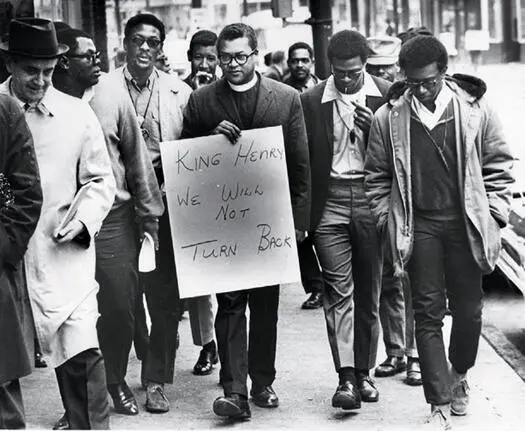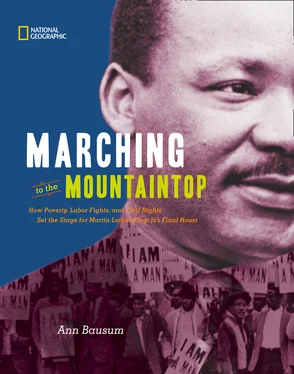The Memphis strike was not the last mass direct action campaign of that era. It was the last campaign in which Dr. King participated. In 1969 we Memphians were again engaged in a massive direct action effort, which began the restructuring of our public schools. More than 200,000 people, including more than 70,000 students, participated. Because of that campaign, I, and others, spent Christmas 1969 in the county jail.

Martin Luther King, Jr., and James Lawson became allies in the fight for African-American rights from their first meeting in 1957. At King’s urging, Lawson used his keen understanding of the power of nonviolence to train many of the young people who went on to play significant roles in the civil rights movement. In 1968, Lawson (above, holding sign) collaborated with King, local youths, labor leaders, and other supporters to champion the need for workers to receive fair treatment from “King Henry,” Memphis mayor Henry Loeb.
I hope that you the readers will see yourselves in these pages. Our work for human dignity and truth is not over. Each generation must do its share. Racism, sexism, violence, greed, and materialism are still with us. You must continue the personal and community nonviolent march toward the promised land.
A Note From the Publisher: Reverend Lawson’s views on the assassination of Martin Luther King, Jr., differ from the account offered in this book, which is based on the official record of the investigation. Drawing on other information, some historians, including Reverend Lawson, believe there are errors in this record. History is not fixed, and controversy is useful. We challenge all budding historians to seek to uncover the truth of this investigation and other historical episodes that further our understanding of ourselves. To read the trial records and draw your own conclusions, please consult The 13th Juror (CreateSpace, 2009) .
INTRODUCTION
“Nobody knows the trouble I’ve seen, Nobody knows my sorrow. Nobody knows the trouble I’ve seen. Glory, hallelujah!”
Chorus from a freedom song based on an African-American spiritual
A s I remember it, the chore of taking out the trash fell to me every week of my childhood. My family might disagree, but if anything could trick my memory into believing this statistic it is my recollection of the garbage itself. Pungent. Disgusting. Foul. Unforgettable.
Back then, garbage was truly garbage. To take out the trash during the 1960s meant to get up close and personal with a week’s worth of refuse in the most intimate and repulsive of ways. No one had yet invented plastic garbage-can liners or the wheeled trash cans we have today. At that time our family’s garbage went into aluminum cans with clanging metal lids. And the garbage went in naked.
In 1968, when I was ten years old, people really cooked. Recipes started with raw ingredients, and the garbage can told the tales of the week’s menu. Onion skins, carrot peelings, and apple cores. The grease from the morning’s bacon. Half-eaten food scraped from plates in the evening. The wet, smelly, slippery bones of the chicken carcass that had been boiled for soup stock. Mold-fuzzy bread. Spoiled fruit. Slimy potato peels. Scum-coated eggshells. Then add yesterday’s newspapers. Used Kleenex. Cat-food cans lined with sticky juices. Everything went into the same metal can out the back door of our home in Virginia.
The story of our garbage multiplied itself to infinity at homes throughout the nation. In communities where temperatures soared, garbage baked in the summer heat like some witch’s stew until foul odors broadcast its location, flies bred on the vapors, and maggots hatched in the waste. Wet, raw, saturated with rancid smells that lingered long after the diesel-powered truck had lumbered away: That was the garbage of the 1960s. The people who collected the trash were always male, and we called them, simply, garbagemen.
It’s universal: Young people take out the trash everywhere, including in Memphis during the 1968 strike.
This book is about the story of garbage in one city—Memphis, Tennessee—and the lives of the men tasked with collecting it during 1968. These men, all of whom were African American, labored brutally hard for such meager wages that many of them qualified for welfare. Six days a week they followed their noses to garbage cans (curbside trash collection had yet to become the norm); then they manhandled the waste to the street using giant washtubs. The city-supplied tubs corroded with time, leaving their bottoms so peppered with holes that garbage slop dripped onto the bodies and clothes of the city’s garbagemen as they labored.
During the 1960s the sanitation workers of Memphis showed up for work every day knowing they would be treated like garbage. By the end of the day they smelled and felt like garbage, too. Unfairness guided their employment, and racism ruled their workdays. So passed the lives of the garbagemen of Memphis until something snapped, one day in February 1968, and the men collectively declared, “Enough is enough.” Accumulated injustices, compounded by an unexpected tragedy, fueled their determination. Just like that they went out on strike, setting in motion a series of events that would transform their lives, upend the city of Memphis, and lead to the death of the nation’s most notable — and perhaps most hated — advocate for civil rights.
Labor relations, human dignity, and a test of stubborn wills drove developments that spring in Memphis, Tennessee. Behind this union of worker rights and civil rights stood the men expected to handle one ever present substance: garbage.
CAST OF CHARACTERS
Southern Christian Leadership Conference
In 1957, heartened by the successful outcome of the Montgomery bus boycott, key organizers team up with colleagues from other communities to form the Southern Christian Leadership Conference, or SCLC, and advocate for social change through the use of nonviolence. Key participants:
Martin Luther King, Jr., president from 1957 until his death in 1968.

Ralph D. Abernathy, treasurer, King’s closest colleague, and the man who succeeds him as organization president.
Lieutenants, such as Hosea Williamsand Jesse Jackson(standing left and center with Kingand Abernathyat the Lorraine Motel in Memphis, April 3, 1968), as well as Bernard Lee, James Orange, and Andrew Young.
Lyndon B. Johnson, President of the United States (1963-1969).

J. Edgar Hoover, director of the Federal Bureau of Investigation (FBI) and the chief force behind FBI campaigns to spy on and discredit Martin Luther King, Jr.
Former FBI agent Frank Holloman, director of the Memphis fire and police departments, and the department’s 800 officers, including undercover staffers Marrell “Max” McCullough, Ed Redditt, and Willie Richmond.
Читать дальше














